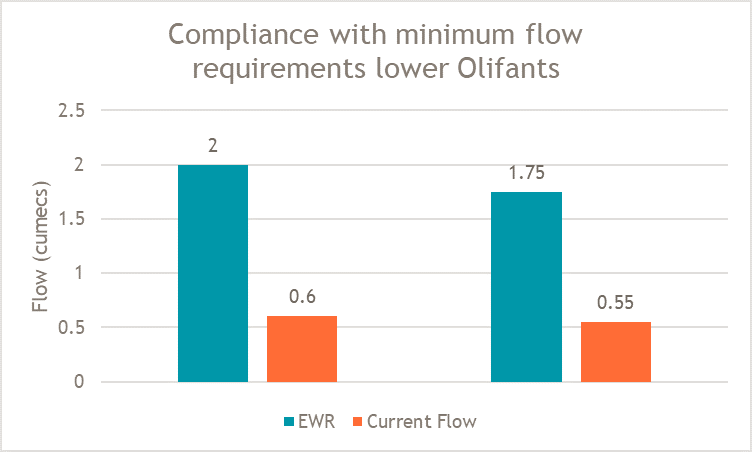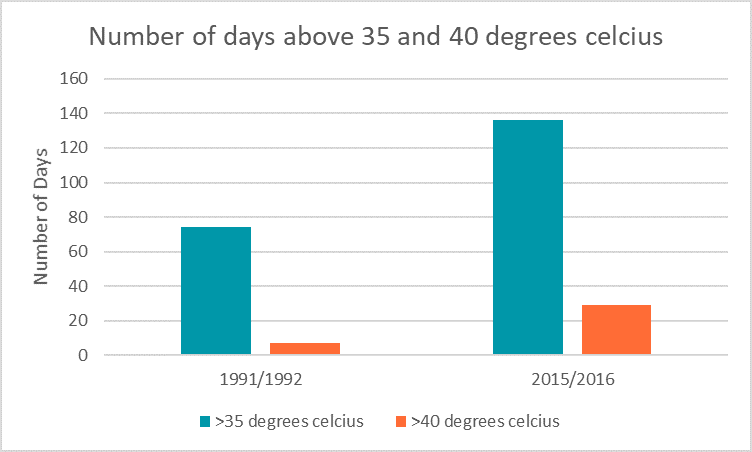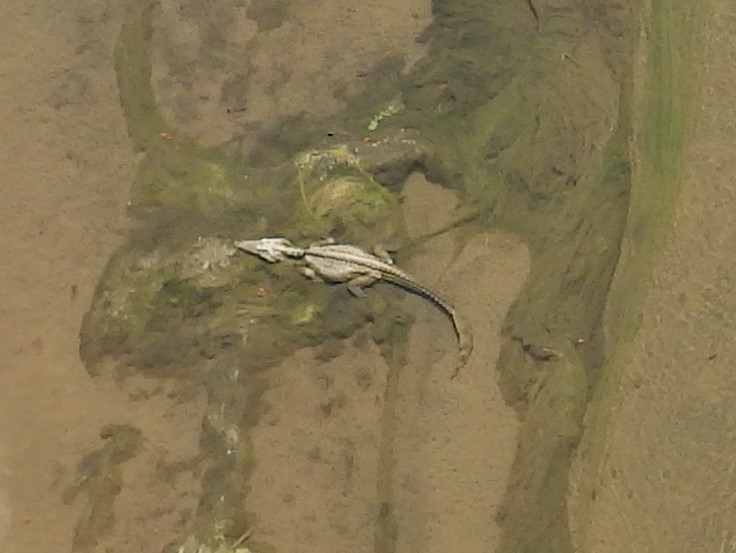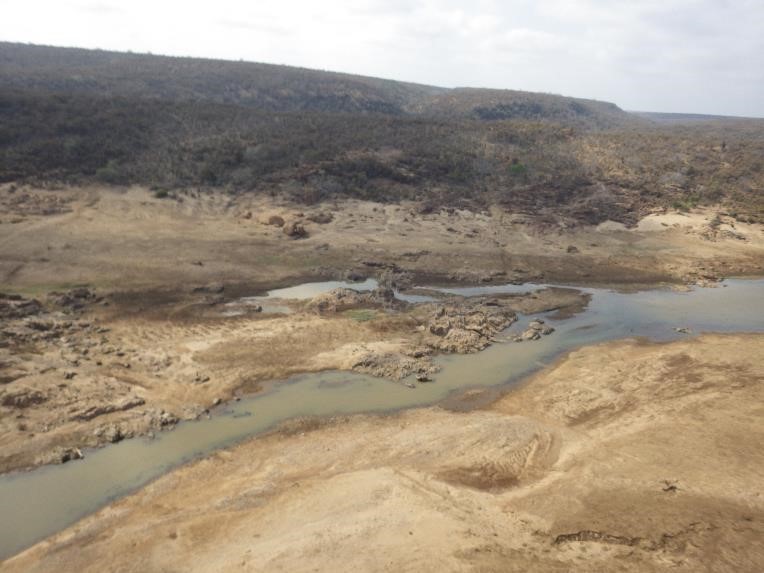Flows in the lower Olifants River are declining rapidly and have reached alarmingly low levels. The Association for Water & Rural Development (AWARD) together with SANParks, have been monitoring the flows in the lower Olifants and warn that if rains do not come, the river could stop flowing in the next month if urgent and immediate action is not taken.
By law, a minimum flow is required for all rivers of South Africa – both to meet basic minimum human needs and to ensure a river resource that is sustainable. “In the case of the Olifants, a minimum drought flow has been gazetted but we are completely and consistently non-compliant” notes Dr Sharon Pollard of AWARD. Flows are less than 30% of the minimum legal requirement as shown in the graph below.

The Olifants is one of the most stressed catchments in South Africa and most infamous for extremely poor water quality as highlighted by the death of crocodiles and fish in 2010. Water availability has declined over the last decade to the extent that parts of the middle and lower Olifants simply have no more water to give. “We have simply run out of spare water in most years” says Hugo Retief of AWARD and yet we see new water users on the river.”
Both SANParks and AWARD have been requesting the Department of Water & Sanitation in Nelspruit to take action. Through the RESILIM-Olifants programme, funded through USAID, AWARD has supported DWS in various ways over the last five years. With the support of the National Department of Water, releases have been made from the de Hoop Dam but this is just a ‘band-aid’ and cannot continue indefinitely.
“Deep systemic issues need to be addressed” remarks Pollard.
“This drought has been unlike any other in that the number of ‘hot days’ (exceeding 40C) has increased significantly when compared to say the drought of 1992” says Dr Eddie Riddell of SANParks.

This situation is now having observable impacts on water users and on ecological health.Those farmers that have a valid water use licence are being impacted by a number of unlawful users – threatening their livelihoods and the livelihoods of workers dependent on these activities. They are requesting the DWS to regulate new users swiftly and to oblige them to join Water User Associations.
Many villages in the Sekororo-Oaks area are reported to be without water. Using water from the Olifants system without a licence will directly impact meeting basic domestic needs of some 80,000 people living in this area. Despite the building of a major pipeline, communities still continue without an adequate water supply. “People are getting by on as little as 8 litres of water per person per day” reports BB Mkhabela following a recent visit to the area. Mogale Lesedi had been queuing at the local well from 6 am to get water and was still waiting at 2 pm when BB met her. She reports that other women start queuing from as early as 2am. Currently people are forced to get water from water vendors at very high costs. “In contrast, residents in Hoedspruit and Phalaborwa use up to 250 litres per person per day” notes Derick du Toit of AWARD. Such huge inequities are currently being exacerbated by the drought.

Mrs Lesedi shows AWARD the well that she collects water from on a daily basis (Photo: AWARD)
Another cost of declining river flow is that water quality problems are amplified greatly. These impact directly on human and environmental health. For example, studies on human health and water quality revealed worrying levels of mercury, arsenic and molybdenum in some areas. Flows into Mozambique are very low and Massingir Dam is only 30% full reports Oscar Sibiya from Ara-Sul in Mozambique.

A recent survey of the Kruger Parks rivers observed some severely emaciated crocodiles seen between western boundary and high-water bridge in Olifants River (Photo: Danie Pienaar)
Water restrictions are urgently needed. “More importantly, these need to be communicated widely with stakeholders and then monitored and enforced” remarks the AWARD/ SANParks team.
We can’t continue to blame drought alone and just be reactive – we know droughts happen, and we need to put in place strong governance and planning systems that acknowledge this. We also know that changing climate is going to result in greater temperatures in the lowveld which will reduce the river flows by 40 – 60%. “Imagine 50% less water in your bucket, that’s huge and that’s what we are facing in the catchment under climate change” remarked Pollard.
Drought and risks to water security are a reality. The release of water from de Hoop on Wednesday may temporarily mitigate the situation but this is not a solution. “Farmers may simply use this additional flow if they aren’t monitored” remarks Dr Riddell.
The DWS Regional Office needs to implement restrictions together with the municipalities, monitor water users and curb unlawful use and communicate widely about the current water situation. Some water users have self-imposed restrictions including both the Blyde and Letaba Water User Associations. Local initiatives such as these and others – like restrictions by the Hoedspruit Airforce Base – need to be supported. SANParks and AWARD will continue to monitor the situation.
About AWARD
AWARD is a non-profit organisation specializing in participatory, research-based project implementation. Their work addresses issues of sustainability, inequity and poverty by building natural-resource management competence and supporting sustainable livelihoods. One of their current projects, supported by USAID, focuses on the Olifants River and the way in which people living in South Africa and Mozambique depend on the Olifants and its contributing waterways. It aims to improve water security and resource management in support of the healthy ecosystems to sustain livelihoods and resilient economic development in the catchment.
About USAID RESILIM O
USAID: RESILIM-O focuses on the Olifants River Basin and the way in which people living in South Africa and Mozambique depend on the Olifants and its contributing waterways. It aims to improve water security and resource management in support of the healthy ecosystems that support livelihoods and resilient economic development in the catchment. The 5-year program, involving the South African and Mozambican portions of the Olifants catchment, is being implemented by the Association for Water and Rural Development (AWARD) and is funded by USAID Southern Africa.



